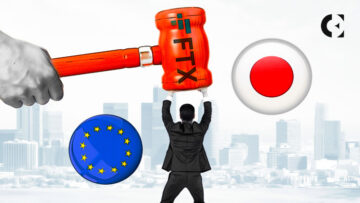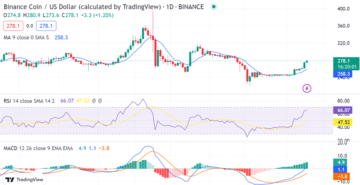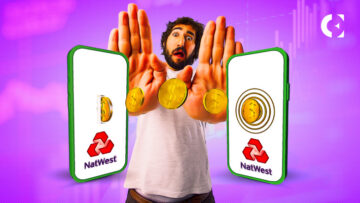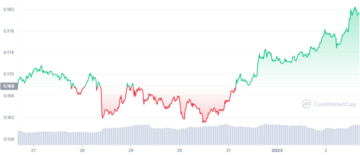
Introduction:
In the rapidly evolving world of web3 gaming, Planet IX is one of the companies leading the way. Their commitment to on-chain assets, sustainability, and user education sets them apart from their competitors. Coin Edition recently had the opportunity to sit down with Karl Blomsterwall, CEO of Planet IX, to discuss the impact of web3 on gaming, the importance of sustainability, and the future of the industry.
His views on the role of blockchain in gaming shed light on the opportunities and challenges that lie ahead for the industry. This interview with Karl is a must-read to get a glimpse of the future of web3 gaming.
Questions:
- Karl, you have been an entrepreneur in the web3 space since its early days. How has web3 changed and shaped e-gaming thus far?
The start of web3 gaming really came with the introduction of the NFT protocol. Enabling verifiable and decentralized ownership of assets in the game did enable not only new business models for the game studios but also new game models and mechanics for the players. With ownership shifting to the users, players are more inclined to invest time and money into games, resulting in higher stickiness.
- How does Planet IX fit into this scenario?
Planet IX aspires to be leading the evolution of web3 gaming. Compared to many of our competitors, we are fully on-chain, meaning that all assets in our game are minted and belong to our users.
Since the start, we have been a gateway for onboarding users to web3, with significant time and resources spent on educating and guiding users in their adoption of the technology. As our users are becoming familiar with the technology, we are constantly evolving and improving, adding new protocols, new features, and new partners.
- Why did you choose Polygon as the game’s platform?
At the time of deciding, Polygon offered the best mix of scalability, security, and decentralization for our game, which by design is quite transaction-heavy, with many smaller transactions.
- As a Swedish company, could you provide some insights about e-gaming in Scandinavia?
Scandinavia has a strong heritage in gaming, with many tier-1 studios based in the region. However, Sweden is unfortunately not at the forefront of blockchain, so our headquarters is based in Zug, Switzerland. This way, we can ensure that we are fully compliant with all regulations in the space and, at the same time, tap into the massive talent pool which Sweden has to offer.
- There is a lot of talk about AI due to ChatGPT. How will AI shape gaming on the chain?
Like any industry, the gaming or web3 sector is bound to be disrupted. At Nibiru, we implement it as a natural part of any process, be it copywriting, visual design, or code development. While we are far from having it operate autonomously, it has proven to be a great tool to enhance processes and make work more efficient.
- How does ownership of assets within the gaming industry affect player engagement and the gaming experience? And what are some of its drawbacks?
If implemented correctly, a shift of ownership to the players increases stickiness, time and money spent and user experience. However, it is extremely important that the game’s tokenomics (the economics of the token) is designed as an integral and integrated part of the game, augmenting the gaming experience rather than an economic layer put on top of an already existing game loop/mechanics.
- Can Planet IX raise awareness about environmental issues among Gen Z?
Definitely, Planet IX leverages its technology, community, and newly established sustainability foundation to improve awareness around environmental issues in our user base.
Firstly, through our foundation (which is funded by revenues from the game), we invest and donate to sustainability projects, with the first donation of 100,000 trees being planted already done. We are also launching in-game assets that generate rewards for NGOs and let users explore and donate directly in the game to different NGOs.
Secondly, our strong sustainability angle has inspired our community of tens of thousands of people to do good. This includes several grass root initiatives, such as picking up trash on beaches and reducing littering, to name a few. This is made possible by an engaged community and user winnings that allow them to take time off.
We also believe NFTs and blockchain will become the de facto technology for NGOs in the future and will be one of the driving forces behind awareness of environmental issues.
- COP28 will take place in Dubai from 30 November to 12 December in another move to fight climate change. What is your message to COP28?
Contrary to public belief, blockchain technology has a lot to offer to reduce climate impact. Firstly, the sentiment in the space is to find sustainable and climate-friendly solutions. Secondly, the efficiency and transparency of smart contracts and blockchain would significantly improve how NGOs donate and use funds.
- Does Planet IX have any plans to incorporate cross-chain interoperability?
Absolutely, cross-chain interoperability is the future of web3 and offers substantial benefits to both products and users. For Planet IX, going cross-chain expands our target audience and makes it simpler for users on other chains to enjoy our game. What is crucial, which many misses, is the importance of ensuring that UX/UI does not suffer from a move from a single chain to multiple chains. We are working on ensuring this before launching on the next chain, which could happen in the not-so-distant future.
- What new opportunities and difficulties do you anticipate due to the continuous growth of esports and competitive gaming? What business models do you think can sustain this trend?
The integration of esports and blockchain makes so much sense. Less administration, lower cost, fully audible, transparent, and true game results, plus automatic payouts to winners are all significant improvements enabled by the blockchain.
We will also see price pools permeate non-professional competitive gaming and esports. As an example, in Planet IX, we are launching our “IX Arena” soon, where winnings are funneled from other parts of our game. This means casual gamers could participate in a quick competitive game anywhere using their mobile or PC and actually win some money, even if they did not put in any themselves. This is a major value proposition compared to current web2 models.
- Where do you see eGaming in 5 years?
In 5 years, the majority of all games will have a blockchain component, but the use cases and penetration will differ. Low integration would be simple things like ensuring skins are NFTs and tradable. High integration would mean tokenomics is deeply rooted in in-game mechanics and designs.
We will see a significant improvement in user experience; for example, signing transactions and interactions will become much more seamless. This will enable true mass adoption of web3 games across the globe. In addition, as the leading channel for onboarding web2 users, games will also branch out to encompass other services, such as financial and social, leading to a much more holistic experience.
Post Views: 11
- SEO Powered Content & PR Distribution. Get Amplified Today.
- Platoblockchain. Web3 Metaverse Intelligence. Knowledge Amplified. Access Here.
- Source: https://coinedition.com/web3-gamings-user-ownership-insights-from-planet-ix-ceo-karl-blomsterwall/
- :has
- :is
- $UP
- 000
- 1
- 10
- 100
- 11
- 7
- 8
- 9
- a
- About
- across
- actually
- addition
- administration
- Adoption
- affect
- ahead
- AI
- All
- already
- among
- and
- Another
- anticipate
- any
- anywhere
- apart
- ARE
- around
- AS
- Assets
- At
- Audible
- audience
- Automatic
- autonomously
- awareness
- base
- based
- BE
- Beaches
- become
- becoming
- been
- before
- behind
- being
- belief
- believe
- benefits
- BEST
- blockchain
- blockchain technology
- bound
- Branch
- business
- by
- CAN
- cases
- casual
- Casual Gamers
- ceo
- chain
- chains
- challenges
- change
- Channel
- ChatGPT
- Choose
- Climate
- Climate change
- code
- Coin
- Coin Edition
- commitment
- community
- Companies
- company
- compared
- competitive
- competitors
- compliant
- component
- constantly
- continuous
- contracts
- copywriting
- correctly
- Cost
- could
- Cross-Chain
- crucial
- Current
- Days
- December
- Decentralization
- decentralized
- Deciding
- Design
- designed
- designs
- Development
- DID
- differ
- different
- difficulties
- directly
- discuss
- donate
- donation
- down
- drawbacks
- driving
- Dubai
- E-Gaming
- Early
- Economic
- Economics
- edition
- educating
- Education
- efficiency
- efficient
- enable
- enabled
- enabling
- engaged
- engagement
- enjoy
- ensure
- ensuring
- Entrepreneur
- environmental
- esports
- established
- Even
- evolution
- evolving
- example
- existing
- expands
- experience
- explore
- extremely
- facto
- familiar
- far
- Features
- few
- fight
- financial
- Find
- First
- fit
- For
- Forces
- forefront
- Foundation
- from
- fully
- funded
- funds
- future
- game
- Gamers
- Games
- gaming
- gaming experience
- Gaming industry
- gateway
- Gen
- Gen Z
- generate
- get
- Glimpse
- globe
- going
- good
- great
- Growth
- happen
- Have
- having
- Headquarters
- heritage
- High
- higher
- holistic
- How
- However
- HTTPS
- Impact
- implement
- implemented
- importance
- important
- improve
- improvement
- improvements
- improving
- in
- in-game
- Inclined
- includes
- incorporate
- Increases
- industry
- initiatives
- insights
- inspired
- integral
- integrated
- integration
- interactions
- Interoperability
- Interview
- Introduction
- Invest
- issues
- IT
- ITS
- jpg
- launching
- layer
- leading
- leverages
- light
- like
- Lot
- Low
- made
- major
- Majority
- make
- MAKES
- many
- Mass
- Mass Adoption
- massive
- meaning
- means
- mechanics
- message
- minted
- misses
- Mobile
- models
- money
- more
- more efficient
- move
- multiple
- multiple chains
- name
- Natural
- New
- New Features
- next
- NFT
- NFTs
- NGOs
- Nibiru
- November
- of
- offer
- offered
- Offers
- on
- On-Chain
- Onboarding
- ONE
- operate
- opportunities
- Opportunity
- Other
- our
- ownership
- part
- participate
- partners
- parts
- payouts
- PC
- People
- Place
- planet
- plans
- platform
- plato
- Plato Data Intelligence
- PlatoData
- player
- players
- plus
- Polygon
- pool
- Pools
- possible
- price
- process
- processes
- Products
- projects
- proposition
- protocol
- protocols
- proven
- provide
- public
- put
- Quick
- raise
- rapidly
- rather
- recently
- reduce
- reducing
- region
- regulations
- Resources
- resulting
- Results
- revenues
- Rewards
- Role
- root
- same
- Scalability
- scenario
- seamless
- sector
- security
- sense
- sentiment
- Services
- Sets
- several
- Shape
- shaped
- shift
- SHIFTING
- significant
- significantly
- signing
- Simple
- since
- single
- smaller
- smart
- Smart Contracts
- So
- Social
- Solutions
- some
- Soon
- Space
- spent
- start
- strong
- studios
- substantial
- such
- Sustainability
- sustainable
- Sweden
- Swedish
- switzerland
- Take
- Talent
- Talk
- Tap
- Target
- Technology
- that
- The
- The Future
- their
- Them
- themselves
- things
- Think
- thousands
- Through
- time
- to
- token
- tokenomics
- tool
- top
- Transactions
- Transparency
- transparent
- Trees
- Trend
- true
- use
- User
- User Experience
- users
- value
- views
- Way..
- Web2
- Web3
- web3 games
- web3 gaming
- Web3 space
- What
- What is
- which
- while
- will
- win
- winners
- winnings
- with
- within
- Work
- working
- world
- would
- years
- Your
- zephyrnet
- Zug












